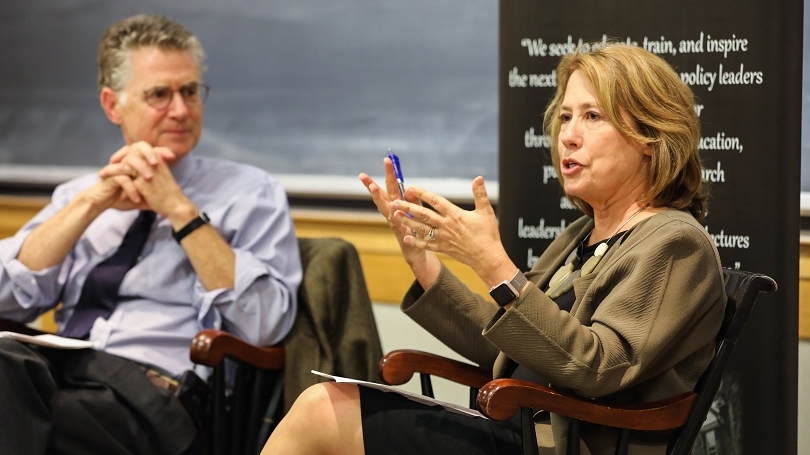
Menu
- Public Policy
- Leadership
- Funding
- News & Events
- About the Center
Back to Top Nav
Back to Top Nav
Back to Top Nav
Back to Top Nav
On October 9th, the Rockefeller Center hosted a conversation between Sheila Bair — former chair of the United States Federal Deposit Insurance Corporation (FDIC) — and Peter Fisher – Tuck School of Business professor and former Under Secretary of the United States Treasury for Domestic Finance. Ms. Bair’s tenure as chair of the FDIC overlapped with the Great Recession of 2008. Her conversation with Professor Fisher touched on indicators of economic growth and decline, structural economic changes that may have set the stage for the 2008 meltdown, and mistakes made in the aftermath.
In an interview prior to the event, Ms. Bair described her career trajectory and shared advice for students. As an undergraduate, Ms. Bair majored in philosophy, and upon graduation, she worked as a bank teller. She went on to law school, a teaching fellowship at the University of Arkansas, and then the General Counsel’s office at the Department of Health, Education, and Welfare (HEW).
At HEW, she focused on compliance with the then-new piece of legislation Title IX. Though much progress had been made in terms of discrimination against gender and race, “there was still a broader issue of economic opportunity and breaking down barriers for women and minorities to enter non-traditional fields and achieve parity and economic opportunity.”
Her role within HEW served as her entrance to the world of government, and she was hooked. Since then, she has worked for Senator Bob Dole, the U.S. Department of Treasury, the New York Stock Exchange, the Commodity Futures Trading Commission, and the FDIC.
In these positions, Ms. Bair has had to face a lot of conflict. She describes herself as “comfortable going against the grain,” and believes that “if you see something that doesn’t sound right to you, even if it’s a minority opinion, you should express it.”
However, according to Ms. Bair, the way in which you go about expressing that opinion matters. “You don’t want to be combative, or condescending, or act like you’re smarter than somebody else,” she explained. Ms. Bair finds a balance between being “diplomatic” and “standing your ground” by engaging dissenters in a conversation that allows both sides to better understand the other’s points.
Nonetheless, voicing an unpopular opinion is difficult, particularly for women working in male-dominated industries, like government or finance. “It’s gotten better, but sometimes people think that women should be in their place, that women shouldn’t talk about big things like finance and mortgages,” Ms. Bair said.
She urged women in the workforce to stick up for each other and to view each other as allies rather than as opponents. Because historically so few opportunities were available to women, it is easy to fall into the mindset of assuming “there’s one spot that’s going to one open for women, and we all have to fight to get that one job,” Ms. Bair said. She advises women to focus on expanding opportunities for all females rather than scrambling for the “one girl spot.”
Ms. Bair had further advice for those who find themselves—as she has multiple times throughout her career—making difficult decisions with limited information. “You could do all your homework, and all your planning, and all your analysis, but almost always, things will not turn out the way you expected them to,” she said. For that reason, she approaches decisions with the assumption that she will need to make adjustments during the execution phase.
Pitching policy ideas and publishing press releases is “fun,” she said, but what ultimately matters is the far-less-exciting implementation of those ideas. She gave the example of the Affordable Care Act, a law with “loft objectives” but that is so “hyper-complicated” as to be “unwieldy,” adding that “the political process of compromise can sometimes lead to this unworkable complexity.”
For those hoping to follow her path, Ms. Bair’s suggestion is simple: “Choose something you find rewarding… Whatever [your] job is, just do well at it, and if you do well at it, new opportunities will come to you.”
Written by Eliza Jane Schaeffer ’20, Rockefeller Center Student Program Assistant for Public Programs
The views and opinions expressed, and any materials presented during a public program are the speaker’s own and do not necessarily represent the views and opinions of the Rockefeller Center or constitute an endorsement by the Center.